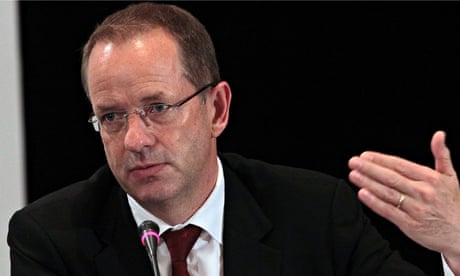The GlaxoSmithKline chief executive, Sir Andrew Witty, has reiterated that his company has a "zero tolerance" attitude to the corrupt sales practices it is being accused of in China and other countries.
Witty, who is battling to repair GSK's corporate reputation, was speaking as Britain's largest drugmaker announced a 14% fall in second-quarter profits to £1.3bn, missing analysts' forecasts.
The company's shares fell nearly 5% to £14.81, making it the biggest faller on the FTSE 100 index. Profits were hit by competition from generic products and the strong pound. The firm now expects full-year earnings per share to be similar to last year.
In China, where GSK has been rocked by serious bribery allegations since last summer, sales continued to fall, dropping 25% to £129m in the second quarter. Chinese authorities are investigating claims that GSK's sales reps paid doctors and health officials up to 3bn yuan (£284m) to push the company's drugs. The China scandal knocked four percentage points off GSK's otherwise stellar sales growth in emerging markets for the latest quarter. GSK staff have also been accused of bribing doctors in Poland, Iraq, Jordan and Lebanon.
Witty said: "I remain very concerned about allegations concerning our China business. The situation is complicated and difficult and while the investigation is active there is little I can add." He said the allegations were "contrary to the values" he believed in.
"In a company of our size operating in almost every country in the world there's always a small potential for some people to step outside procedure," Witty said. "This isn't acceptable, and where we are aware of misconduct, we take action including dismissal from the company." He added that the company had changed the way it did business, including "how we reward our sales representatives, and stopping payments to doctors to speak on our behalf or to attend medical congresses".
Last week GSK admitted it had dismissed staff in China in 2001 for bribing health officials. Britain's Serious Fraud Office recently began a criminal investigation into the drugmaker's sales practices around the world and said on Wednesday that it was working with the Chinese authorities for the first time ever.
SFO head David Green told Reuters the Chinese government had a clear interest in rooting out bribery and corruption, though it might have "slightly different perspectives" from the SFO. The US department of justice is also investigating GSK for possible breaches of the foreign corrupt practices act.
A British-US couple, who have been charged with illegally obtaining private information by China, will now be tried in public rather than in secret after the US and British governments raised concerns. This could mean the trial date, previously scheduled for 7 August, is moved.
Peter Humphrey and Yu Yingzeng, who ran a Shanghai corporate investigation consultancy for foreign firms operating in China, were hired by GSK last year to investigate a break-in after a video of the company's former China boss, Mark Reilly, having sex with his girlfriend in his Shanghai home was emailed anonymously to 13 GSK executives, including Witty. The whistleblower sent a series of other emails containing detailed allegations of fraud. Reilly has been accused by Chinese authorities of running a "massive bribery network" and could face a long prison sentence.
Humphrey said he felt "cheated" by GSK, because he had not been given the full details of the corruption allegations. GSK hired his firm ChinaWhys to investigate the "serious breach of privacy and security" relating to Reilly rather than the allegations themselves. GSK's internal investigations have not found any evidence of widespread fraud. Witty said he was unable to comment on Humphrey's assertion.
Despite the problems in China, emerging markets put in a strong performance, with GSK sales up 11% , which partially offset declines in Japan and the US of 7% and 10%. European sales were flat. Turnover in the second quarter fell 4% to £5.6bn.
GSK has introduced new inhaled medicines – Breo and Anoro – to offset the decline in its biggest seller, the asthma drug Advair, which still makes up nearly a fifth of sales but has come off patent. Uptake of Breo has been slow while Anoro, which has just come on to the US market, looks more promising, Witty said.
He said GSK was in a period of transition, and stressed that it had a strong pipeline of new medicines, with six drugs approved last year and more than 40 in late-stage development. The worst of the patent losses are behind it. GSK believes Tivicay, to treat HIV, could become one of its most successful launches.
